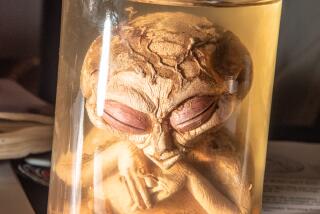Cult Leader Shows History of Elusiveness
- Share via
MONTREAL — Whether dead or in hiding, Luc Jouret, the 46-year-old Congo-born cult leader who founded the doomed Order of the Solar Temple, is proving as elusive as ever, confounding efforts to fathom the nature of his organization.
Newspaper headlines describe his temple as a doomsday cult, a charge seemingly borne out by the death of more than 50 members this week--48 in Switzerland and four in Quebec. Specialists say, however, that, while in Quebec, Jouret never preached death in apocalypse but instead focused on survival of the elite after a cataclysmic crisis.
Spurred by complaints from parents of child cult members and from disgruntled former members, Quebec officials suspected that Jouret was up to something untoward but could never find evidence to prove it. Even a gun conviction against him proved so minor that the judge sentenced him only to donate $1,000 to the Canadian Red Cross.
Jouret, a homeopathic doctor who received his medical degree in Brussels, was so persuasive and personable that Hydro-Quebec, the government-owned power company, paid him $4,394 in 1988 and 1989 to lecture employees on self-awareness and motivation--and paid the employees $3,106 to listen. Later, when the cult fell under suspicion, Hydro-Quebec investigated his link to its employees but uncovered nothing illegal. When transmission towers were sabotaged, suspicion fell on the cult again, but no evidence was found linking members to the damage.
Bertrand Ouellet of the Center for Information on New Religions in Montreal told the Canadian Broadcasting Corp. that the deaths were puzzling because the Solar Temple did “not fit the profile of a Bible-reading apocalyptic group.” Instead, he said, Jouret and his followers, while they were sure a terrible crisis was impending, envisioned themselves as medieval Knights Templar who would survive the crisis and lead new generations to a better world.
Yves Casgain, a researcher for Info-Cult, a private Montreal organization that studies cults in Quebec, agreed with Ouellet that it is a mistake to believe all such cults must follow the Jonestown and Waco examples and end in suicide and murder. In Jonestown, Guyana, in 1978, 913 cultists took their own lives. Last year in Waco, Tex., about 80 members of the Branch Davidians died during a battle with federal agents.
But Casgain said in an interview that the Solar Temple group may have changed its view of the world after troubles in Quebec last year. He said this was implied in a letter and documents apparently mailed before the fires in Switzerland and received Thursday by cult researcher Jean-Francois Mayer in the Swiss city of Lausanne.
Mayer told the CBC that the documents show that the cult members believed there was “a wide conspiracy against them.”
Casgain, who never met Jouret, studied the cult after various complaints were filed against it with the police. The accusers insisted that Jouret was forcing people to remain in the group against their will. “I found that there was a certain amount of control of people, a certain amount of pressure,” he said. “But we could not find the evidence to support the accusations.”
Jouret was born in the old Belgian Congo, now Zaire, and grew up in Belgium, where he was educated, graduating in medicine from the Free University of Brussels in 1974. He practiced in Europe, India, Africa, China, the Philippines and Peru but was not recognized by the Quebec Corp. of Physicians to practice in Canada.
During this period, evidently after a spiritual awakening in the Philippines, Jouret founded the cult.
Jouret and his followers, mainly Swiss and French, moved to Quebec sometime in the mid-1980s. Jouret reportedly believed that Quebec would be one of the parts of the globe least affected by the impending and forbidding crisis that awaited the world. The cult bought expensive properties north of Montreal, including an old monastery on 100 acres of land that it turned into an organic farm.
Jouret became a much sought-after speaker, especially by Montreal businesses that wanted him to motivate their workers. He published a book in 1992 titled “Medicine and Conscience,” in which he wrote that people are worn down by their own egocentric perception of life. “Our bodies weaken under a constant stress, poisoned by fear of the future,” he wrote.
His problems developed in 1993, when police began investigating the complaints. The most vocal complaint came from Rose-Marie Klaus, an ex-member who accused the cult of brainwashing people like herself and her Swiss husband into giving up their savings.
“Jouret thinks he’s Christ,” she told reporters then. “He told people that a great cataclysm is going to take place and that only the elected will survive. He persuaded several people to leave Europe, sell everything and invest in his project (the organic farm).”
Police put Jouret and the cult under surveillance, wiretapped his phones and even staged a raid that netted a few guns. The guns led to charges that prompted Jouret to flee Quebec. He returned a few months later, however, and was found guilty with two others of illegal arms possession.
Jouret insisted that the guns had been acquired only to protect members, and the judge accepted the explanation, meting out fines that were to be paid to the Red Cross as contributions.
Powered by the news of the bloody raids on the Waco sect, rumors and reports spread about the Order of the Solar Temple. The cult was suspected of being behind a shadowy group that had plotted the assassination of a Quebec minister and of destroying two Hydro-Quebec transmission towers. But no evidence was ever found.
Police believe that there are perhaps 100 members of the cult still in Quebec. Fearing mass deaths like those in Switzerland, officers have been posted on their compounds. Most cult members refused to talk with reporters, but some, especially those on the organic farm, insisted that they had broken with Jouret after he armed some members for protection.
There was shock in Quebec over the deaths of friends in Switzerland. In Richelieu, where the town flag flew at half-staff Thursday, colleagues insisted that Mayor Robert Ostiguy and his wife, who were among several Quebeckers who died Wednesday, could not have killed themselves.
“It has to be murder,” said town Councilman Michel Deroche. “I knew them too well.”
More to Read
Sign up for Essential California
The most important California stories and recommendations in your inbox every morning.
You may occasionally receive promotional content from the Los Angeles Times.










